- Home
- Matthew Costello
Beneath Still Waters Page 28
Beneath Still Waters Read online
Page 28
what Passworthy might have showed the governor to per-
suade him. Was it some kind of otherworldly artifact?
Something left in Gouldens Falls? Or did Passworthy dare
to threaten the governor himself, perhaps with a display
of his newfound power?)
No matter.
The dam was built. The town inundated.
Rogers held the last legible page of the diary in his
hand.
“It’s only half here, Dan.” He passed it over to him.
It was labeled “The Pentagram of Solomon,” an enor-
mous five-pointed star surrounded by words and runes . . .
half of them gone.
He looked at Rogers. Was he buying any of this? Am I?
“Chief, what do you—”
Rogers stood up. “Dan, I’m not an especially religious
man. Like most of us, I pray when there’s nothing else left.
I’d be lying if I said that this wasn’t all . . . a bit hard to
take. But, son, I’m afraid there’s something that has to be
done here.” He looked down at the pentagram. “You have
to find the rest of this somehow. It would seem like the job
started fifty years ago . . . must be finished.”
Easily said. But where would he find the rest of the pat-
tern (if it’s really true . . . if it’s not some fable . . . a folk tale)?
And like a gift from heaven, he had an answer.
“Chief, I’ve got an idea. But I’m worried about Su-
san . . . she could be at the dam. I’d appreciate it if you’d
get her away from there.”
Rogers held up his hand. “No problem. I’ll call my boys
on duty there. I’ll have them look for her. Go look for her
myself if I have to.”
Dan stood up. “Thanks.”
He picked up the fragment of the last page. Fifty years
ago it hadn’t worked. There were five of them, like the five
points of the star. Five.
270
m a t t h e w j . c o s t e l l o
But one had gotten away.
So it didn’t work.
And now it was up to him, and maybe Rogers, to some-
how settle the fate of Gouldens Falls.
He left the police station.
They were still coming! She sensed it, even though when
she looked back, she saw nothing . . . just her own rough
trail through the lush bushes and scrawny saplings.
“I’m tired,” Joshua wailed.
“Me, too, Josh. Me too. Keep going, just a bit farther,
and we’ll take a break.”
They were well into the park, making their own path
through the thick mesh of plants and trees. Claire was keep-
ing up a good pace, but the little ones were flagging.
But she knew that they couldn’t stop.
What had happened to the two cops? And Mrs. Benny?
(She thought of the old Buffalo Springfield song;
“. . . something’s happening here . . . what it is ain’t ex-
actly clear.”)
She had a plan. Not, certainly, to move toward the quiet
roads to the west. Someone easily could have followed the
road from the Benny house and be waiting for them there.
No, she was going to circle around the lake (staying
clear of the water), around and over to Route 100C, a ma-
jor highway. It would be easy there to get someone to stop
and take them . . . somewhere safe.
(And just where is that?)
“Puh-lease,” Joshua cried again, “I . . . can’t . . . walk
anymore.” He was crying, a little boy on the edge of total
collapse.
She went up to him, knelt down.
(Giving another check over her shoulder, and then a
quick glance down to the water.)
“There, there, Joshua, you can keep on go—”
b e n e a t h s t i l l w a t e r s
271
“No, I can’t! I wanna go back home. I wanna—”
He fell into her, melted into her body, ready now for
even a stranger to try to make him feel better.
There was only one thing to do.
Her arms circled around his small, well-packed little
body. She lifted him up. His head collapsed immediately
onto her shoulder, and his legs circled around her body,
monkeylike.
Just standing there holding him was hard.
“Okay,” she said breathlessly to Claire. “Keep going,
honey, but start moving a bit more to the right.”
She hoped that she had led them far enough into the
park to pass the lake.
As they walked, she constantly checked the ground,
searching for those funny black things.
And with each step she took, Joshua felt heavier and
heavier.
Max Wiley woke from his nap feeling oddly disoriented.
Where am I? he wondered. What day is it? Is it morning or night?
But as he lay there he slowly remembered just what was
going on. I took a nap. Because tonight—oh, yeah—is the
costume party. The kickoff to the four days of celebration.
And all the old families of Ellerton would be there.
(With all their nice old money!)
He sat up, got out of bed, and opened the blinds.
It was dreary and overcast outside.
Not a particularly nice summer’s day.
He opened up his closet and took out his costume. It
was all red, from the tip of his red tights to the thin, rub-
bery skullcap with two stubby horns.
The cape, trimmed with a golden brocade, was draped
over a chair in the corner. Resting right next to it was a nice
long pitchfork.
272
m a t t h e w j . c o s t e l l o
(Just the thing for loading the souls in the next meat
truck to hell, heh heh.)
Some nice red makeup for his face (with heavy, dark
eyebrows) and . . . voilà!
A perfect little devil.
He looked in the mirror.
Big party . . . big announcement . . . big doings in El-
lerton.
It’s gonna be a hot time in the old town tonight!
“I was about to go down to dinner. Mrs. Thomas gets so
cross if I’m late.” Reverend Winston smiled. “Besides, they
like me to say grace.”
Time seemed slow here. A small mantel clock on Win-
ston’s dresser leisurely clicked off the minutes.
And there just wasn’t time enough to tell Winston every-
thing.
Dan handed him the paper. “I wouldn’t ask you to look
at it if it weren’t important.”
“Well, if it doesn’t take too long.” Winston took the
photocopy Dan handed him and started searching for his
glasses. “I need my bifocals for this.”
He put them on. “Oh, dear, wherever did you get this?”
Winston looked right at Dan, a startled expression on
his round, gentle face.
“Billy Leeper led me to it.”
Winston raised his eyebrows.
“It came from the First Lutheran Church of Gouldens
Falls.”
Winston shook his head. “Are you serious?”
“I found it there myself. Do you know what it is?”
“Why, certainly I do. Of course I do. It’s the Pentagram
of Solomon. Though I must admit I haven’t seen a copy of
it outside of a church text in yea
rs.”
b e n e a t h s t i l l w a t e r s
273
Winston studied it, following the crisscrossing lines,
touching the symbols. “Nearly destroyed Christianity, it
did. It was used by a splinter sect of the Albigensian
Heresy. They had continued the traditions of the Cabala in
the Old Testament. Do you know the Cabala?”
He shook his head.
“It was a very old form of black magic, from the earliest
days of Judaism. Not exactly approved by the rabbis
but often tolerated. It . . . infected some of the early Christ-
ian groups, who mixed the occult with the new, true faith.”
Winston fingered the truncated design. “They were very
powerful . . . very. Until the group was purged.”
Dan walked next to the old man, looked over his shoul-
der. “Do you think you could complete the design?”
“What? You mean, finish the pattern?”
“Yes.”
Winston studied the paper some more. “You found this,
you say, in the church?”
Dan let him study it some more.
Winston looked up at him. “I won’t ask what you’re
doing, Dan. I just pray that you’re not in over your head.”
The reverend walked over and removed a heavy, gilt-edged
book from his library shelf.
Dan smelled the old worn leather, the tangy smell of
paper.
Winston laid the book on his small bed.
“This book dates from, yes, 1923. Documents and Arti-
cles Concerning Early Christianity. Volume 9. Heresies. ”
He flipped through the pages.
“Here we are. Let me have a pen.”
Like an ancient scribe, Winston huddled over the mas-
sive book. The clouds—growing thicker and darker all
day—now turned an ugly black as the invisible sun settled
below the hills to the west.
It was getting late.
274
m a t t h e w j . c o s t e l l o
Winston’s room felt cold and uncomfortable.
“There.” Winston picked up the completed sketch and
handed it to Dan.
Now came the tough part. (Stuff and nonsense, he
thought . . . stuff and nonsense.)
Dan removed a small vial of water from his shirt pocket.
Right from out of the tap.
“Would you bless this, Reverend?”
“Are you serious?” He looked over his glasses.
“Very.”
Winston made the sign of the cross over the water. “God
bless . . . whatever you’re up to.”
“Thank you,” Dan said quietly. He turned to leave. “If
all goes well, I’ll come back . . . and tell you everything.”
“Yes,” Winston said. “Please do that.”
But already Dan was moving down the stairs, taking the
steps two at a time. Hurrying.
I’m late for dinner, Winston thought.
Nonetheless he knelt down on the cold, hard floor,
placed his hands together, and prayed.
As he promised, Paddy Rogers put a call in to Susan’s pa-
per. He was told that she hadn’t come back from the dam.
He knew she had a young daughter, so he called her
home. The phone rang once, then twice, before an answer-
ing machine clicked on.
Perhaps she’s still at the dam, he thought. Though it
looked real nasty out then, with the heavy clouds bringing
an early darkness to the summer evening. A thunderstorm
was on its way. His office was so cold, he was tempted to
turn on some heat.
He picked up the phone and had the switchboard patch
him directly into the cops’ radios at the dam.
Their radios had to be on—it was a regulation.
No one answered him.
b e n e a t h s t i l l w a t e r s
275
He had told Dan he’d wait for him. Here.
(To do what? Help him track some phantom from fifty
years ago? The more he thought about it, the more he thought
it was a lot of silliness. Murder may have been committed
years ago. But it was more likely over earthly matters.)
He then decided to take a run over and see what was
going on at the dam. He told the night desk-sergeant that
he’d be back in an hour.
He drove there himself.
The first thing he noticed was the people gathered
around the plaza . . . dozens of them, some eating, some
drinking beer. As if the fireworks and the celebration were
tonight. It was still light enough to see the banner, but soon
a battery of spotlights would be turned on.
He passed the plaza and curved up and around to the top
of the dam.
The police car was there. The door was wide open. And
another car . . . a Rabbit.
“What the—” he muttered, pulling alongside the Rabbit.
He got out of his patrol car. He looked right, then left,
and saw no one.
He took a step closer to the water’s edge . . . the better to
see the shoreline as it twisted its way around the reservoir.
Up near the barricades there was a heavy truck. It
looked like a State truck, but there didn’t seem to be any
workers around.
He was, he quickly realized, alone.
He took a step back to his patrol car.
Have to call this in. Get some more boys down here.
Find out where the hell everyone went—
He took another step.
Someone grabbed his arm.
Herbert Blount was directly under the wall, looking—my
God, yes—straight up. It was so grand the way it curved
276
m a t t h e w j . c o s t e l l o
away from him, from the wide base to the narrow roadway.
It almost looked like he could climb it.
He took a bite of his ham sandwich.
Other people had brought their dinner here. To the dam.
It was a regular picnic. A party. People just milling about,
looking at the banner. Sipping coffee and chewing sand-
wiches.
Lots of people. Just hanging around.
All of them waiting . . .
For, well—a funny thing—Herbert didn’t know what he
was waiting for.
And that didn’t bother him in the least.
T W E N T Y - T H R E E
He removed his knife from its sheath. The blade was over
six inches long and one and a half inches wide, with a
razor-sharp serrated edge. It could cut. It could tear. He
once jabbed a nosy tiger shark in the snout with it (stupidly
drawing a whole school of the medium-sized nasties, known
to take a chunk out of a diver now and then). He also used
it once to neatly fillet a water buffalo (and the meat had not
been worth the effort or the stench—not by a long shot).
He had used the knife to cut vines and small trees to make
a lean-to in the Canadian Rockies right in the middle of a
sudden blizzard.
But had he never killed a man with it.
He checked his watch. It was a little after six. He had
called the police station, but Rogers had left. Another call to
Susan’s house and he just got the answering machine again.
( Funny. No matter what goes on in our lives, no matter
wh
at crisis . . . what problem . . . the voice on the answering machine tape remains oh so calm and unflappable. )
He knew where she had to be.
He knew it in the same way you know that, God, you’ve
278
m a t t h e w j . c o s t e l l o
done something really dumb, really stupid this time. Here
we were, one by one, traipsing on down to the dam, hang-
ing around—
Waiting.
Only now he knew what might be coming.
He fingered the sheathed knife. It sat on the seat beside
him like a silent passenger.
The paper was in his shirt pocket.
Over his head. That’s what Reverend Winston had said.
Could be, Danny, boy. Could very well be.
Her mom held Joshua tightly, but her breath was ragged.
She was grunting, groaning—
How much longer could she carry him?
Her own legs felt like wobbly rubber sticks, ready to go
all bendy and useless.
Once she saw them. Behind them. Searching for them.
They climbed a hill, and despite the too thick clusters of
leaves, she could see down, to the small ravine they had
just left.
The two policemen were there, the dark navy blue of
their uniforms now looking so horribly black.
And someone else, trailing just behind them.
It was not the man in the suit. It looked more like . . . a
woman.
Samantha started to cry.
“I can’t . . . go . . . anymore,” she wailed.
Claire took her hand. “Sure you can, Sammy. We’re
almost there.”
Are we? Her mother thought she was taking them to the
big highway, where there’d be lots of cars . . . lots of people.
But was she taking them the right way?
“I can’t!” Samantha cried.
She gave Samantha’s hand a gentle squeeze.
“Just a bit more. You can do it . . . sure you can.”
b e n e a t h s t i l l w a t e r s
279
Her mother’s panting grew more hollow, more terrible
in its pain.
How much longer can she go on? Claire wondered.
And what happens to us when she stops?
It looked like somebody was having a party. There was
Susan’s car. A patrol car. Another cop car with the word
chief neatly lettered over the Ellerton insignia.
And there was nobody around.
Dan took the knife and looped his belt through the
opening in the sheath.
He got out of his Rover.
The silence was total.
Where was everyone? In the woods . . . up on the road-
way . . . or maybe in the goddamn lake itself?
The water moved.

 Cherringham--Too Many Lies
Cherringham--Too Many Lies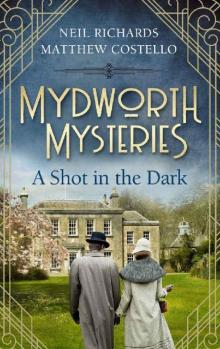 Mydworth Mysteries - A Shot in the Dark (A Cosy Historical Mystery Series Book 1)
Mydworth Mysteries - A Shot in the Dark (A Cosy Historical Mystery Series Book 1) Cherringham--The Gentleman Vanishes
Cherringham--The Gentleman Vanishes Cherringham--Cliffhanger
Cherringham--Cliffhanger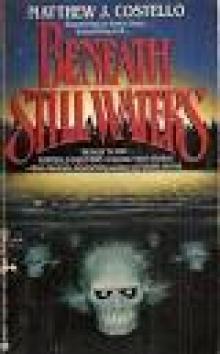 Beneath Still Waters
Beneath Still Waters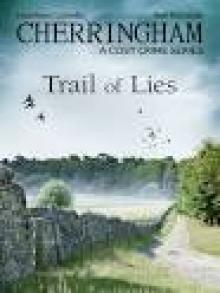 Cherringham--Trail of Lies
Cherringham--Trail of Lies The Gentleman Vanishes
The Gentleman Vanishes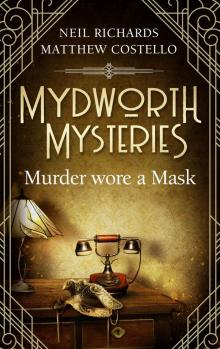 Mydworth Mysteries--Murder wore a Mask
Mydworth Mysteries--Murder wore a Mask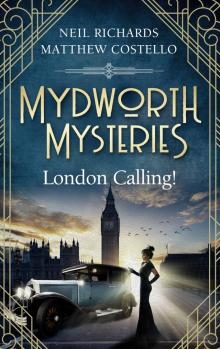 Mydworth Mysteries--London Calling!
Mydworth Mysteries--London Calling!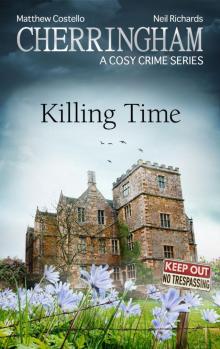 Cherringham--Killing Time
Cherringham--Killing Time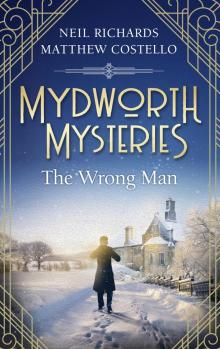 Mydworth Mysteries--The Wrong Man
Mydworth Mysteries--The Wrong Man Cherringham - The Drowned Man
Cherringham - The Drowned Man Cherringham--Killer Track
Cherringham--Killer Track Cherringham--The Secret of Brimley Manor
Cherringham--The Secret of Brimley Manor A Deadly Confession
A Deadly Confession Cherringham--Murder under the Sun
Cherringham--Murder under the Sun Cherringham - A Dinner to Die For
Cherringham - A Dinner to Die For Family
Family Cherringham--Death Trap
Cherringham--Death Trap Cherringham--The Curse of Mabb's Farm
Cherringham--The Curse of Mabb's Farm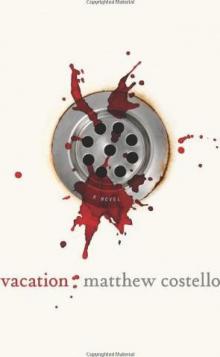 Vacation
Vacation Cherringham--A Bad Lie
Cherringham--A Bad Lie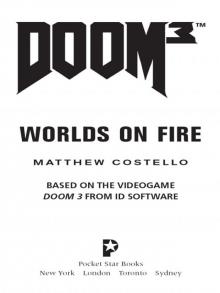 Doom 3™: Worlds on Fire
Doom 3™: Worlds on Fire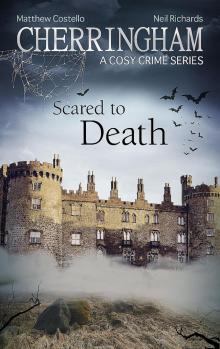 Cherringham--Scared to Death
Cherringham--Scared to Death Home
Home Dead in the Water
Dead in the Water Star Road
Star Road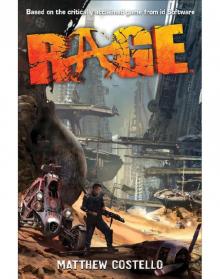 Rage
Rage Cherringham--A Fatal Fall
Cherringham--A Fatal Fall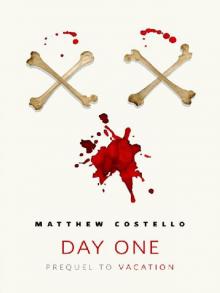 Jack Murphy_Prequel_Day One
Jack Murphy_Prequel_Day One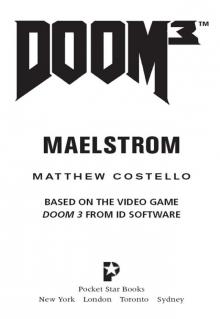 Doom 3™: Maelstrom
Doom 3™: Maelstrom